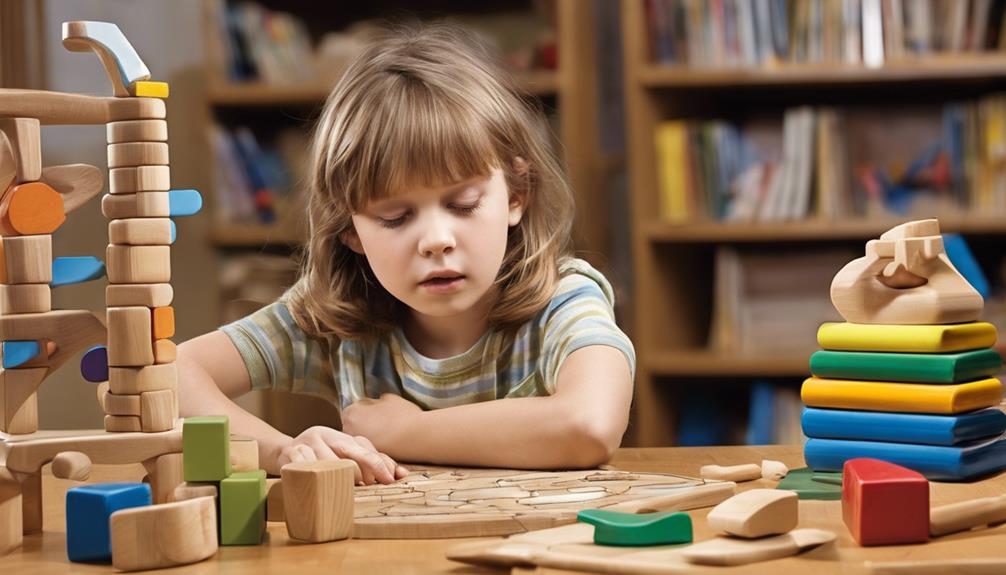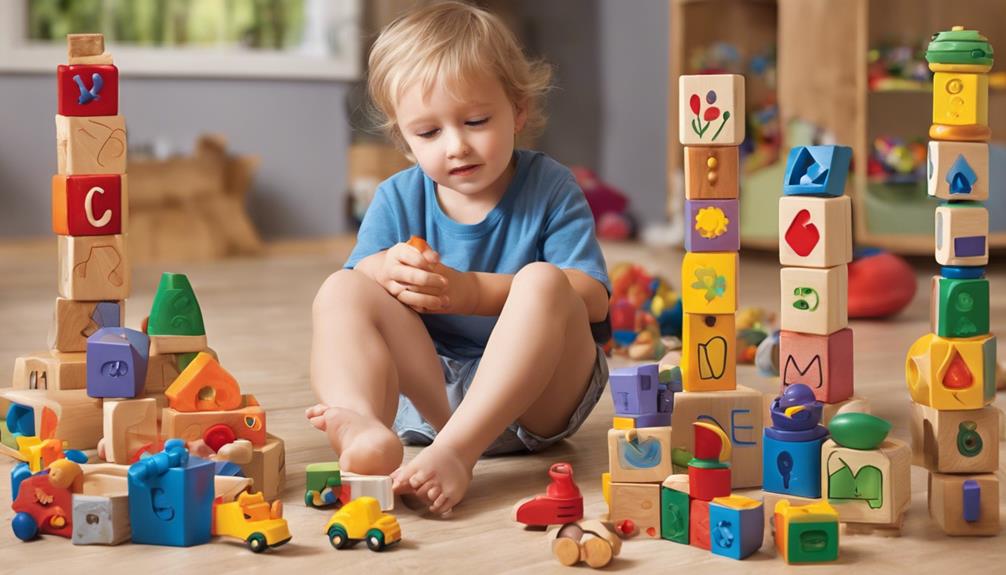When considering child development progress, one may argue that it's challenging to assess accurately due to the diverse nature of children's growth trajectories.
However, by utilizing a combination of milestone tracking methods, behavior observation techniques, cognitive development assessments, social skills evaluation strategies, and physical growth measurements, we can gain a thorough understanding of a child's developmental journey.
These evaluation tools not only provide valuable insights into a child's progress but also pave the way for tailored interventions and support.
Key Takeaways
- Milestone tracking assesses development across key areas for early identification of delays.
- Behavior observation techniques help quantify behaviors and tailor interventions for developmental delays.
- Cognitive development assessments identify strengths and areas needing support for personalized educational strategies.
- Social skills evaluation focuses on interactions and non-verbal communication to enhance social development.
Milestone Tracking Methods
Using milestone tracking methods is essential in evaluating and monitoring a child's development progress across key areas like language, motor skills, social interactions, and cognitive abilities. Assessment through developmental milestones allows for a thorough evaluation of a child's growth and can reveal any potential developmental delays or areas of concern. By systematically observing and documenting a child's achievements against established developmental milestones, caregivers and healthcare providers can gain valuable insights into the child's development trajectory.
Methods of assessment, like milestone checklists, provide a structured approach to monitoring a child's progress and comparing it to expected norms. This systematic tracking enables early identification of any deviations from typical developmental patterns, prompting further evaluation if necessary. An evaluation through milestone tracking not only aids in identifying potential issues but also guides personalized interventions and support strategies tailored to the child's specific needs. Developmental evaluation based on milestone tracking forms the foundation for proactive and targeted interventions that aim to optimize a child's developmental outcomes.
Behavior Observation Techniques

Behavior observation techniques provide valuable insights into a child's development by systematically watching their actions, interactions, and responses in various settings. These techniques play an important role in early childhood education and special education, allowing professionals to assess a child's progress effectively.
By focusing on specific behaviors such as social skills, emotional regulation, communication, and problem-solving abilities, observations help in understanding a child's strengths, challenges, and areas needing support. Checklists and rating scales are commonly used tools to quantify and track behaviors over time, aiding in the assessment process.
For children with developmental delays, behavior observation techniques are particularly significant as they provide a way to tailor interventions and individualized plans to meet their unique needs. Professionals rely on these observations to monitor the effectiveness of strategies implemented to support child development.
Cognitive Development Assessments

Cognitive development assessments play an important role in evaluating a child's thinking, reasoning, problem-solving, and memory skills. These assessments are essential in tracking a child's cognitive progress and shaping appropriate educational strategies. Here are five key points to take into account:
- Cognitive development assessments involve tasks like puzzles, memory games, sorting activities, and verbal reasoning exercises.
- They help identify a child's strengths and areas where additional support or early intervention may be needed.
- Professionals utilize standardized tests, observations, and developmental checklists to evaluate cognitive development accurately.
- Evaluating cognitive development is necessary for tailoring educational strategies to support a child's learning abilities effectively.
- Tracking a child's cognitive development progress over time provides valuable insights for enhancing educational interventions and ensuring the best growth.
Social Skills Evaluation Strategies
Observing a child's interactions with peers, adults, and the environment provides valuable insights into their social skills development. By looking for indicators such as sharing, turn-taking, empathy, and cooperation, we can assess their progress in this important aspect of child development. Evaluating non-verbal communication, eye contact, body language, and responses to social cues further refines our understanding of their social skills. Utilizing validated tools like the Social Skills Improvement System (SSIS) enables a more structured measurement of social competence.
Collaboration with parents, teachers, and therapists is essential in creating effective interventions tailored to enhance a child's social skills. Involving these stakeholders guarantees a holistic approach to supporting the child's social development. Regular feedback and progress updates to parents allow for continuity between home and educational settings, maximizing the impact of interventions. By focusing on social skills evaluation strategies, we can better nurture children's abilities to form meaningful connections and navigate social interactions successfully.
Physical Growth Measurements

Physical growth measurements are crucial indicators of a child's overall health and development trajectory, encompassing tracking height, weight, head circumference, and body mass index (BMI) on a regular basis. When evaluating children's physical growth, several key points should be taken into consideration:
- Growth charts based on age and gender provide a comparison to average growth patterns.
- Pediatricians use growth percentiles to determine a child's growth rate and overall health.
- Monitoring physical growth helps detect potential health issues or developmental concerns early.
- Consistent growth measurements are essential for evaluating the effectiveness of nutrition, exercise, and overall health interventions.
- Regular physical growth assessments contribute to understanding a child's overall well-being and can guide early interventions if needed.
Frequently Asked Questions
How Do You Evaluate Child Development?
We evaluate child development by tracking milestones in cognition, language, motor skills, and social-emotional growth. Observation, documentation, and assessment are vital methods. Tools like ASQ, PEDS, or M-CHAT aid in thorough assessment. Collaboration with professionals guarantees accuracy and support.
How Do You Evaluate a Child's Progress?
We evaluate a child's progress through ongoing assessments, embedded in daily routines, and focused on developmental milestones. Collaborating with families is key to setting goals, reflecting on growth, and fostering communication between educators and parents.
How Do You Assess a Child's Developmental Level?
Evaluating a child's developmental level involves tracking milestones in various areas. Observation, documentation, and formal evaluations are key methods. Developmental screenings like ASQ can identify delays. Monitoring progress over time is essential for understanding developmental trajectory.
How Do You Measure a Child's Progress?
We measure progress through observations, assessments, and documentation across developmental domains. Tracking cognitive, physical, language, social-emotional, and learning skills helps us understand growth. Balancing formal and informal assessments guides personalized instruction and interventions for each child.
Conclusion
To sum up, evaluating child development progress is like exploring a map. Tracking milestones, observing behaviors, appraising cognitive and social skills, and measuring physical growth are all important markers along the way. By utilizing tools like ASQ and seeking evaluations from specialists, caregivers can guarantee they're on the right path to supporting their child's development.
Remember, just like a compass guides us on a journey, these evaluations can provide direction for helping children reach their full potential.









